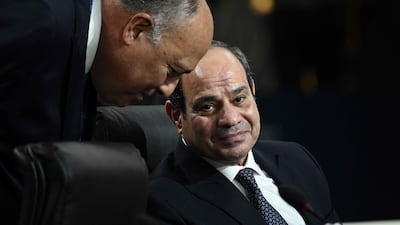Egypt's President Abdel Fattah El Sisi has called on the US to help Africa deal with its rapidly growing number of malnourished people.
Speaking at the US-Africa summit in Washington, the Egyptian leader said a third of the world's 800 million people suffering from “weak food security” lived on the continent.
The 2022 figure of 800 million, he said, marked an increase of about 150 million since 2019.
“How can a continent like Africa not be able to produce its food? And how does a nation, which does not produce its food, reap the benefits of its economic development or have the stability to build for the future?” said the Egyptian leader.
He called on the US to use its “economic weight” to bolster mechanisms for responding to food crises in Africa and to reduce the debt burden on the most vulnerable African nations through partial forgiveness or swapping debts for investments.
He also urged international financial agencies to ensure that African nations secure “sustainable financing” and to ease borrowing conditions.
Egypt, the most populous Arab nation with 104 million people, has an external debt of more than $150 billion. Its rapid population growth, its limited sources of fresh water and, more recently, the damaging fallout from the Russia-Ukraine war have drawn attention to the delicacy of its food supply.

The country depends on the Nile for almost all its fresh water needs, a major reason behind its concerns over a large dam that Ethiopia is building on the Blue Nile, the river's main tributary and the source of some 80 per cent of the water reaching Egypt.
The dam, Egypt says, poses an existential threat and could, if it causes a reduction in the country's share of the river's water, wipe out millions of jobs in agriculture and disrupt its food balance.
“That there is a close link between food and water security is beyond doubt. It's a link that Egypt views as a question of national security,” Mr El Sisi told the Washington summit in a thinly veiled reference to the Ethiopian dam.
“This in turn must produce the political will to draft a legal framework to regulate co-operation between nations that share water resources.”
Ethiopia has rejected proposals by Egypt and Sudan, another downstream nation, to enter a legally binding agreement on the operation of the dam and mechanisms to deal with persistent drought.
Earlier this week, during a meeting with US Secretary of State Antony Blinken, Mr El Sisi asked Washington to mediate in his country's dam dispute with Ethiopia.


